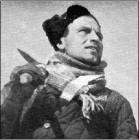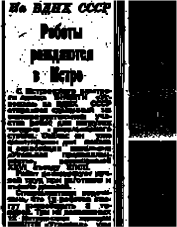

| In This Issue |
 |
 |
 |
"Well, the first thing you have to remember is that these protests were not organized by unions," he said. "They were spontaneous actions."
Did he mean that his union didn't take responsibility for the protests?
"No, we take responsibility," he said. "We certainly helped negotiate the settlement. And the unions gave the protests a more civilized character. But on the whole, these protests were not organized, coordinated acts. That's not how they started."

|
Evidence indicates that, contrary to what the news reports are telling you, Russia is not experiencing "labor problems." It's going through a full-fledged social meltdown. That's what it's called when tens of thousands of people, union members and non-union members alike, are willing to lay down on railroad tracks in the middle of nowhere at the drop of a hat, without any prompting at all. Or when within a two or three-month period virtually every region and industrial center in a country with 11 time zones (see diagram) is struck not only by work stoppages, but by hostage-takings, property seizures, lock-ins, bombings and other uncoordinated, spasmodic, and sometimes overtly criminal counterattacks against employers and local authorities.
One hugely under-reported aspect of the railroad blockages, which were tabbed "Miners' Strikes" in headlines everywhere, were the extremely large number of people protesting who were not miners. Jim Catterson of the International Chemical and Energy Works union, who edits the Pay Us Our Wages cyber-campaign on the internet, said he was surprised by the lack of attention paid the teachers, doctors, and other white-collar state workers who were out there on the tracks with the miners.
"You just didn't hear anything at all about it," he said.
According to Kravchenko, these people, who are loosely termed "budgetniki" because they're supposed to be paid out of the state budget, made up as many as one third of the protesters in some areas.
"In Kuzbass, budgetniki were at least a third of the protesters, if not more," he said. "And there were budgetniki in almost all the other sites as well."
Imagine what kind of news reports we'd be reading in the United States if doctors, teachers, and miners-people who don't even speak to each other socially in normal situations-were to start lying down on train tracks together in half a dozen cities across the country. What if assembly workers from the General Dynamics plant in Quincy, Massachusetts piled into vans with physical therapists and radiologists from Cambridge and schoolteachers in Lexington to sit in the woods in some godforsaken hole like Assonet to block the railroad tracks to Providence? You'd have to be thousands of feet in the air in the highest of ivory towers not to see that as the first groundswells of social apocalypse.
"It certainly goes way, way beyond anything I've ever heard of," said Vito Turso, a spokesman for the Central Labor Council for New York and a veteran of American labor disputes. "It would be hard to place that in the context of an American dispute."
Another striking aspect of the recent railroad blockages were the lack of attention being paid to them as political actions impugning the legitimacy of the Yeltsin government. After all, if the kinds of things that are taking place now had taken place during Soviet times, the entire world would be ablaze with apocalyptic headlines foretelling the end of communism. In fact, a lot of the things that have happened lately are eerily similar to Soviet-era anti-government protests. In March, for instance, a group of Russian fishermen effectively defected in Lyttleton, New Zealand, refusing to return home with their ship until they were paid their back wages. And it is these very same protesting miners, of course, who helped propel Boris Yeltsin into power through their protests against the Gorbachev regime.
Back then, the world was willing to listen when Russians wanted to complain about violations of their human rights. Write a single haiku in the Reagan years about living next door to a KGB officer who flushed his toilets too often, and you were an automatic candidate for the Nobel Prize for Literature. Now, though, at a time when mass violations of human rights are being committed on a scale not seen since the Stalin years-and even in its heyday, the Gulag Archipelago didn't use the services of more unpaid laborers than modern Russia-the complaints of individual Russians don't seem to be finding much resonance anywhere.
Not that the protests haven't been newsworthy. On April 9, more than 2 million Russians in 74 out of 89 regions participated in work stoppages. On that same day, 100,000 workers marched in downtown St. Petersburg, with an additional 100,000 marching in other parts of the St. Petersburg region. The railroad blockages managed to hold up more than 600 trains on one line. Teachers in Khakassia blocked all the highways out of the capital, while scientists blocked the roads out of Vladivostok. The Polish Solidarity movement looks like the Berkeley Student Union's 60's protests in comparison to numbers like these.
Still, for some reason, our level of interest in the non-payment story seems to be measured in terms of how far we think "they" are from storming the streets with pitchforks and ousting the government which is acting as custodian to our Russia-based mutual funds.
Over the last few years, Western audiences have become used to reading stories about Russians not being paid their wages. In fact, that genre of news article has become richly diverse, with stories about workers who are being paid in everything from dildos ("Talk about getting the shaft!" said Turso) to vodka, or even of teachers in the Koma province who were told by the government that they could dig up public graves as compensation for their salary debt. On the other hand, the almost daily ledger of violent protests over the non-payment crisis has been more or less ignored. It took a desperate, concerted nationwide effort by tens of thousands to bring interregional transportation to a standstill, with groups threatening to block six highways out of Moscow, to break the ice.
In this atmosphere, Russians are left to conclude that unless people in the West have a political motive to take them seriously, their problems will exist only as entertainment for the outside world.
"A general strike warrants a few seconds on TV news, and otherwise you get a complete blackout," said Catterson.
People who follow trade and labor issues overseas said that the Russian non-payment crisis, and the deaf ears the protests surrounding it have fallen on, should be taken together as a warning to anyone who thinks his rights are guaranteed in the new global world order. Lori Wallach of Global Trade Watch, a Ralph Nader organization dedicated to international trade issues, pointed out that the Russian non-payment crisis does not even constitute a censurable violation in the laissez-faire ethics of today's global capitalism.
"What is happening in Russia is totally legal according to GATT," she said. "The only thing that would be illegal is if another country blocked the import of Russian coal because Russian miners were mistreated. That country, if it were a GATT member, would have to allow the import of Russian coal no matter how many years Russian workers went unpaid."
So an entire country can stop paying its workers and still be GATT-compliant?
"Easily," she said. "Again, there are no laws in GATT which act on behalf of individual rights. There are only laws which restrict a country's ability to pass protective legislation. So you can have whole industries supported by child labor and still be GATT compliant, but if you forbid the import of a product because it's produced by child labor, you violate GATT.
"What's happening in Russia, in which workers are absolutely isolated from any domestic or international protection, and are left to fight for themselves at the risk of unemployment, this is totally in line with the vision of international trade in GATT."
Workers in Russia can't even trust their unions, as evidenced by the fact that their most explosive protest to date was undertaken without their direction. Trade unions in Russia are the country's largest property owners, so they don't have all that much incentive to challenge the status quo. That might be why their rhetoric tends to be a lot more conciliatory than the actions of their charges would seem to dictate.
"No new protests are being planned," said Kravchenko, when asked when the miners might go nuts again.
But since the government has agreed to eliminate debt according to schedule, won't there come a point at which workers might protest again if they're still not paid?
"Well, sure," he said. "But we're not the ones setting that timetable." Who is setting that timetable? The workers themselves, of course-a formally unrelated coalition of laborers, teachers, doctors, and scientists, who'll act again basically when they get fed up again. They could be sharpening the guillotine as we speak. Who knows? Not the unions. Not anybody. Get ready for anything.
 | |
 | You think the eXile sucks? Just imagine what Muscovites had to read in March, 1981. Here's our first in a series of dives on the wreck of communist journalism, an intrepid visit to the long-dead official organ of the Moscow Oblast Committee of the CPSU, Leninskoye Znamya. This exciting back-page story told readers that a type of robot had been developed which would aid electrical workers in metallurgical factories. In the stirring, Hercule Poirotian climax to the piece, writer "V. Mansurov" announced: We couldn't locate Mansurov, but ex-VDNKh officials confirm that 17 years later, 3 of those same robots can now do the work of 2 men. Two pages earlier on that same March 4 issue, readers were treated to text translations of Soviet General Secretary Brezhnev's and Czechoslovakian Gensek "G Gusak's" respective toasts at a Kremlin reception. Brezhnev toasted Gusak 3 times and was met with torrential, unending applause. Gusak toasted Brezhnev 4 times and was met with merely torrential applause. |

F.Scott Fitzgerald was wrong-there was one more. One big and especially nasty one, if the Moscow Times is any guide. While tycoons as a class have been making a comeback for ages now, the word "tycoon" as a propaganda tool apparently required the emergence of Boris Berezovsky
as a prominent public figure before it could be successfully revived.
After having used the word fewer than 30 times in each of the years 1994, 1995 and 1996, the Moscow Times in the month of May, 1998 alone used the word "tycoon" 25 times. In 23 of those instances, they were describing Berezovsky. In almost every instance, they used the word with the same darkly disapproving tone that, ironically enough, Soviet propagandists used to bring to its closest Russian translation, magnat- suggestive of a callous, fatbodied exploiter of vast kingdoms of natural riches for his own personal use, a man in a tall black top hat who walks past the pits with his nose scrunched up on his way to telling the foreman that coffee break is hereafter canceled in favor of longer work days.
Like a top hat and a pencil moustache in cartoons, the word "tycoon" in a news article is a great identifier of villians. Once you've got that tycoon tag firmly stuck on someone, readers will be ready to blame him for almost everything-and let everyone else off. Which means you can blame him for anything. Or try, anyway. In any case, here's a quick rundown on the mileage the MT got out of the ty-word in May:
Date: May 30
Headline: President Asks TV to Toe State Line.
Tycoon: Boris Berezovsky
Other tycoons mentioned without being called tycoons ("non-tycoon tycoons'): Vladimir Gusinsky
Berezovsky blamed for: manipulating public opinion
Not blamed for: the 1986 Red Sox, measles
Date: May 29
Headline: Yeltsin Backs Ruble, Market Steadies
Tycoon: Boris Berezovsky
Non-tycoon tycoons mentioned: Vladimir Potanin, Mikhail Khordakovsky, Alexander Smolensky
Date: May 28
Headline: Big Loan Needed to Save Ruble
Tycoon: Boris Berezovsky
Berezovsky blamed for: Being a "proponent of devaluation", "actively stoking rumors of a ruble crash"
Not blamed for: Shyness in adopted children of lesbians, Scatman John record sales
Date: May 27
Headline: Media Chiefs Accuse Kremlin of Meddling
Tycoon: Boris Berezovsky
Berezovsky blamed for: Controlling ORT even though he doesn't hold the majority stake
Not blamed for: Hogging the remote, World Wars One and Two
Date: May 26
Headline: Yeltsin Lashes Out at Media
Tycoon: Boris Berezovsky
Berezovsky blamed for: Being a "worst censor"
Not blamed for: Keanu Reeves's acting in "Devil's Advocate", pukh, gnats
Date: May 26
Headline: Star Tokobank Falls Down
Tycoon: Boris Berezovsky
Berezovsky blamed for: "Stalking Tokobank"
Not blamed for: Stalking Valerie Bertinelli
Date: May 25
Headline: Russia Far From Indonesia Scenario
Tycoons: Boris Berezovsky, Vladimir Potanin
Berezovsky alone implicitly blamed for: Aiding communists by allowing his media outlets to provide alarmist coverage of crisis
Implicitly exonerated of: Most of the Atlanta child murders, man's helplessness to know his true role in creation
Date: May 21
Headline: General Rolls Forward
Tycoon: Boris Berezovsky
Non-tycoon tycoons mentioned: Vladimir Potanin
Date: May 19
Headline: Government Tightens Control of TV
Tycoon: Boris Berezovsky
Non-tycoon tycoons mentioned: Vladimir Gusinsky
Date: May 19
Headline: Next Step Could Be Kremlin
Tycoon: Boris Berezovsky
Berezovsky blamed for: Supporting Lebed, possibly considering talking Lebed out of reversing the results of privatization sometime way, way in the future
Not blamed for: OJ getting off, greenhouse gases, the phenomenon of farting, subpar nursing in volunteer field hospitals
Date: May 15
Headline: Tycoon's Daughter Charged
Tycoon: Who else?
Berezovsky blamed for: Siring drug-taking degenerate
Not blamed for: The way Hitler turned out, the way Stalin turned out
Date: May 14
Headline: American Appraiser to Evaluate Svyazinvest
"Tycoon-turned politician": Boris Berezovsky
Berezovsky blamed for: Complaining that Svyazinvest auction was rigged
Not blamed for: Questioning the officiating in Bulls-Pacers game, complaining loudly in English at French restaurants, blaming it all on abduction by Satanists in youth
Date: May 6
Headline: Russia Plans to Unite Infrastructure
Tycoon: Boris Berezovsky
Berezovsky blamed for: Displaying eagerness to "wrangle control over Russian Media"
Not blamed for: Wearing Wranglers, Charles Rangel's accent


